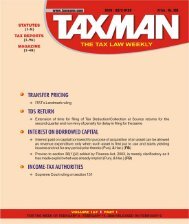CPT V24P7-Art1 (Content).pmd - Taxmann
CPT V24P7-Art1 (Content).pmd - Taxmann
CPT V24P7-Art1 (Content).pmd - Taxmann
Create successful ePaper yourself
Turn your PDF publications into a flip-book with our unique Google optimized e-Paper software.
Direct Tax Laws<br />
case of Kochkunju Nair (supra) and in the light<br />
of definitions of “owner” and “ownership” as<br />
found in Black’s Law Dictionary (6th Edition)<br />
Black’s Law Dictionary (6th Edition) defines<br />
“owner” as under:-<br />
652<br />
“The person in whom is vested the<br />
ownership, dominion, or title of property;<br />
proprietor; he who has dominion of a<br />
thing, real or personal, corporeal or<br />
incorporeal, which he has a right to enjoy<br />
and do with as he pleases, even to spoil<br />
or destroy it, as far as the law permits,<br />
unless he be prevented by some agreement<br />
or covenant, which restrains his right.”<br />
Black’s Law Dictionary (6th Edition) defines<br />
“ownership” as under:-<br />
The term “ownership” has been defined to<br />
mean, inter alia, as “Collection of rights to use<br />
and enjoy property, including right to transmit<br />
to others…..The right of one or more persons<br />
to possess or use a thing to the exclusion of<br />
others. The right by which a thing belongs to<br />
some one in particular to the exclusion of all<br />
other persons. The exclusive right of possession,<br />
enjoyment, and disposal; involving as an essential<br />
attribute the right to control, handle, and dispose”<br />
Moreover, the following principles with regard<br />
to rights in the case of “ownership” emerge<br />
from the decision of the Supreme Court in the<br />
case of Swadesh Ranjan Sinha v. Haradeb Banerjee<br />
[1991] 4 SCC 572.<br />
(a) The term “ownership” which denotes the<br />
relationship between a person and an object<br />
forming the subject-matter of his ownership<br />
consists of a complex of rights, all<br />
of which are rights in rem, being good<br />
against the entire world and not merely<br />
against specific persons.<br />
(b) There are various rights or incidents of<br />
ownership such as right to possess, use<br />
• DT - Secs. 45 & 54F<br />
and enjoy the thing owned and a right<br />
to destroy or alienate, though it need not<br />
necessarily be present in every case.<br />
(c) Such a right may be indeterminate in<br />
duration and residuary in character.<br />
(d) A person has a right to possess the thing,<br />
which he owns, even when he is not in<br />
possession, but retains only a reversionary<br />
interest, i.e., a right to repossess the<br />
thing on the termination of a certain period<br />
or on the happening of certain event.<br />
CONCLUSION<br />
August 1 to 15, 2012 u TAXMANN’S CORPORATE PROFESSIONALS TODAY u Vol. 24 u 32<br />
4. In the light of the above discussion and the<br />
specific attribute of “ownership” found in the<br />
Black’s Law Dictionary (6th Edition) as the<br />
right of one or more persons to possess or<br />
use a thing to the exclusion of others, the<br />
conclusion of the High Court to the effect “on<br />
the admitted fact that the assessee herein, as<br />
an individual, does not own any property in<br />
the status of an individual as on the date of<br />
transfer, we have no hesitation in accepting<br />
the case of the assessee, thereby allowing the<br />
appeal” runs counter to the definition and one<br />
of the attributes of the term “ownership” (as<br />
seen earlier) and, therefore, it is submitted,<br />
with respect, that the decision of the Madras<br />
High Court in the case of Dr. (Smt) P.K.Vasanthi<br />
Rangarajan (supra), appears to be wrong and<br />
requires re-consideration by a Full Bench.<br />
Moreover, it can never be the intention of the<br />
Legislature to exempt the assessees from the<br />
rigours of proviso to section 54F of the Act<br />
in respect of co-ownership of residential<br />
properties under the pretext that they(the coowners)<br />
are not the exclusive owners of such<br />
residential properties.<br />
•••











![“FORM NO. 3CEB [See rule 10E] Report from an ... - Taxmann](https://img.yumpu.com/45480232/1/190x245/form-no-3ceb-see-rule-10e-report-from-an-taxmann.jpg?quality=85)





